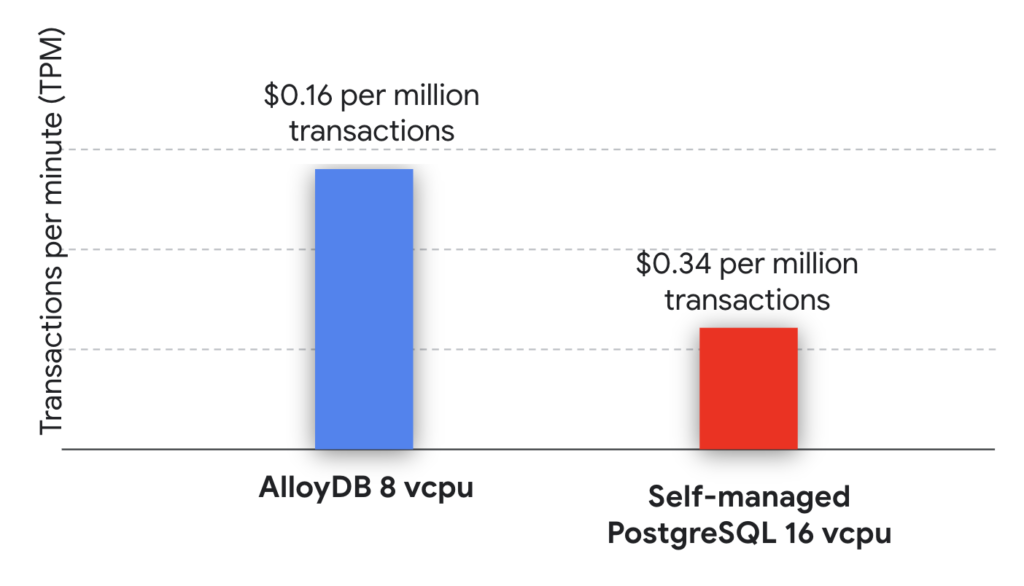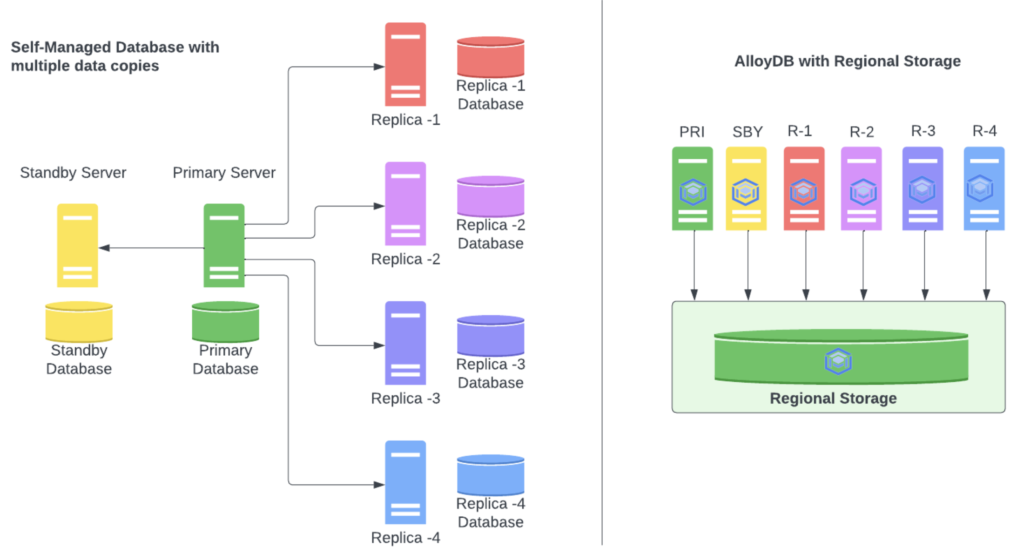AlloyDB for PostgreSQL Database
With its powerful, dependable, and scalable database solutions, PostgreSQL database is an open-source, relational database management system that is highly developed. It includes many features that guarantee data integrity and business continuity, including as performance, availability, and security. PostgreSQL database is a flexible and affordable alternative to proprietary database systems, which makes it the perfect choice for businesses looking for a flexible database foundation for their vital applications. Its broad extensibility and active community support further contribute to its appeal.
Meanwhile, AlloyDB for PostgreSQL is a fully managed, enterprise-grade database service from Google Cloud that keeps complete compatibility with the normal PostgreSQL database engine while adding a number of enhancements: With its higher performance, high availability, and scalability, AlloyDB surpasses ordinary PostgreSQL database to handle even the most demanding workloads. Additionally, AlloyDB uses machine learning and Google’s unique infrastructure to provide intelligent resource optimisation, automated database management, and faster analytical queries. This makes AlloyDB a desirable option for businesses in need of a robust and efficient PostgreSQL-compatible solution. Which then ought should you select?
Google Cloud demonstrated AlloyDB at Google Cloud Next 24, offering up to 4x greater transactional performance on the same-sized instance and up to 2x better price-performance than self-managed PostgreSQL. This article delves further into the information underlying that comparison and highlights other benefits that AlloyDB provides.
Contrasting performance
With AlloyDB, Google Cloud introduced self-managing autopilot capabilities like adaptive vacuum management and automated memory management, as well as transactional and query processing layers to PostgreSQL’s kernel. AlloyDB outperforms regular PostgreSQL when combined with its automatic storage tiering and intelligent distributed storage solution.
A performance comparison test was conducted by Google Cloud to compare the cost-effectiveness of AlloyDB to self-managed PostgreSQL operating on Google Compute Engine (GCE), taking into account both cost per transaction and total cost of ownership (TCO). Google Cloud evaluated self-managed PostgreSQL 15 operating on two VMs prepared for HA, each with 16 vCPU / 128GB Memory, against AlloyDB for PostgreSQL database configured with HA on 8 vCPU / 64 GB Memory:

Even with only 50% of its computing resources set up for self-management, AlloyDB demonstrated superior TPM. When databases are set up to cache 30% of the data, price-performance and performance can be up to two times higher than when using self-managed typical PostgreSQL database workloads. The fact that AlloyDB’s CPU utilisation was almost 90% indicates that the kernel is making far better use of the resources at its disposal.
Google Cloud saw a 4x improvement in speed when AlloyDB was deployed with the same GCE SKU (16 vCPU/128GB). Better price-performance is achieved with a higher vCPU count thanks to AlloyDB’s scalability architecture. Up to 128 virtual CPUs, or 864GB of RAM, are currently supported by AlloyDB.
Large-scale data handling with standard PostgreSQL database on Compute Engine is hampered by resource limits such CPU scaling problems and IOPS restrictions. Be aware that the manual resources needed for the database to self-manage are not included in this analysis, nor are there any additional fees associated with inter-zone networking that may raise overall expenses.
Further financial savings
The same local colossus storage is used by AlloyDB compute instances in a cluster. This means that all replica nodes up to 20 at the time this blog was published that are added when you deploy HA share the same storage. In a self-managed environment, for instance, if you have a 5TB database with HA and 4 read replicas, your storage costs will be 6x the capacity (one primary, one standby, and 4 read nodes). You will only need to pay for one 5TB expense when using AlloyDB.

Furthermore, it is not necessary to pre-provision AlloyDB’s storage capacity and set up additional space for IOPS. The cloud-scale architecture of AlloyDB allows for dynamic storage consumption that grows and contracts in response to demand. Just the capacity that you utilise is charged for.
AlloyDB cross-zone data replication for replica and high availability is free of charge. You can extend horizontally with the same storage and with data that is almost real-time, with read replica lag as low as 25x.
Additionally, you can use AlloyDB as a single datastore for workloads related to transactional, analytical, and vector databases. Multiple databases are not required for these uses, which eliminates the need for extra computing, storage, networking, and ETL deployment and management.
While managing PostgreSQL databases on your own infrastructure can save money, there are a number of drawbacks and additional expenses. These involve managing hardware resources continuously, scheduling capacity for peak workloads, and manually handling crucial database operations including scaling, deployment, security, high availability, backups, and disaster recovery. Your staff may get overworked as a result, and administrative expenses may increase.
In order to help you run your mission-critical applications with a 99.99% uptime SLA, including maintenance, AlloyDB offers a fully managed experience that satisfies these standards.
The winner is AlloyDB
With shared regional storage and up to a twofold price-performance gain, AlloyDB outperforms self-managed PostgreSQL database in terms of cost savings. Furthermore, AlloyDB greatly reduces the difficulties that come with self-managed databases by automating repetitive administrative tasks, providing minimal maintenance downtime, on-demand vertical (read/write) and horizontal (read-only) scalability, and incorporating columnar engine & AI capabilities. AlloyDB offers self-managed PostgreSQL setups a better, faster, and more affordable option with these capabilities and advantages.
